|
<< -- 3 -- Roderic Dunnett FULL CIRCLE

Time and again Paule Constable's lighting got it right too -- most obviously
at emphasising the nasty and shocking -- a corpse here, the plotting pair
there, or nasty little pools of light on a dripping tap or the series of
different-sized (but otherwise identical) gold cages, which double, shiveringly,
as crowning throne, banqueting throne and the deliberately nasty-looking
miniature frontstage casket, in which the crown visibly -- and ominously
nestles, like a caged golden rat or a gleaming gremlin biding its moment.
Duncan himself (Gess Whitfield) arrives on a full-size gold horse carriage
(after an Equus-like retinue of gold horses crosses the stage in
miniature). It's a compelling image : the beckoning gold is like a plaited
nexus, in which all the witches' threads of life somehow meet and interwine,
germinate and terminate, there in front of our eyes. The very panelled rooms
of the castle in which the Macbeths plot Duncan's murder, lord it over social
mayhem (and, if we are to believe it, deprivation and famine) and will ultimately
meet their individual demises, echo the image too, in Wards ideally forbidding
imagery haunts and lingers : its point could scarcely be better made.

The deed is done: The Macbeths in Phyllida Lloyd's ROH production. Photo: Performing Arts Library
|
Michaels-Moore has a nice tang to his voice -- not unlike Andrzej Hiolski,
doyen of the Warsaw opera, though there's much more weight and positive
loading to Michaels-Moore's lower range, bringing him somewhat closer to
Miles's resonant Banquo. Their duet singing was terrific. Fellow-bruiser
he may be, but Banquo, father-to-be of kings, spots the rot early on. 'The
evil spake true!', as Piave succinctly has it. Miles spits this out like
a rotten cherry.
Piave, unlike Shakespeare (who starts with the fatal letter), gets Lady
Macbeth in a nutshell at the start too : Guleghina's first uttered word
is 'ambitioso'. There's a coffin-like bath awaiting her too, rearstage,
and a front of stage tap comes and goes, so the water motif -- most obvious
in Lady Macbeth's sleepwalking scene (Act IV, scene I of the play) -- is
there from the outset. When the bath reappears, on cue, shortly before her
expiry we might well fear she's going to cut her wrists (the old questions
: did she commit suicide? die in childbirth?). Guleghina dwells on each
note, with a loving kind of trill, too : she's a real obsessive, you feel,
built for the job. When she flutes winsomely, nursed by Young's alluring
trings, on 'Will Duncan be here?' we shiver; this would-be royal's hellish
ensuing aria confirms our worst fears.

Maria Guleghina as Lady Macbeth. Photo: Performing Arts Library
|
Continue >>
Copyright © 25 July 2002
Roderic Dunnett, Coventry, UK
 RODERIC DUNNETT ON THE RESIGNATION OF NICHOLAS PAYNE
THE ROYAL OPERA HOUSE, COVENT GARDEN WEBSITE
RODERIC DUNNETT ON THE RESIGNATION OF NICHOLAS PAYNE
THE ROYAL OPERA HOUSE, COVENT GARDEN WEBSITE
|

